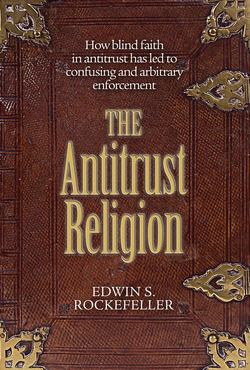Читать книгу The Antitrust Religion - Edwin S. Rockefeller - Страница 10
На сайте Литреса книга снята с продажи.
Change through Rejection of the Faith
ОглавлениеFaith in antitrust—as a policy and as an enforcement mechanism—overcomes reason based on either theory or evidence. In 1978, using economic theory, then-professor Robert Bork made obvious the paradox of the pursuit in the name of antitrust of the mutually exclusive goals of protectionism and a free market.30 Adjustments in antitrust doctrines have occurred, but the statutes remain unamended, and Supreme Court precedents remain available to state attorneys general, private plaintiffs, and federal authorities whenever they choose to be “vigorous” about enforcement.
In 1976 Richard Posner, while a University of Chicago Law School professor, recommended repeal of all antitrust statutes except section 1 of the Sherman Act.31 In 1986 professor D. T. Armentano concluded that “antitrust law” has lost “its claim to legitimacy” and explained why.32 Several years ago Robert Crandall and Clifford Winston of the Brookings Institution assessed the evidence on whether antitrust policy improves consumer welfare. They concluded that there is no evidence that it does.33
There is little reason to believe that evidence, or the lack of it, any more than economic theory, can counteract the nation’s commitment to faith-based antitrust. As Armentano pointed out, the benefits of antitrust regulation are substantial—especially to the antitrust community. Yet that group’s indifference or even opposition to change is not the primary obstacle to repeal of the antitrust statutes. The primary obstacle to repeal is the depth of the nation’s faith in antitrust. That faith is held not only by those who profit from antitrust enforcement but also by those for whom it is a costly nuisance. The antitrust statutes will not be repealed or significantly amended as long as faith in antitrust retains its grip on the psyche of journalists, academics, and policymakers.
It is possible that the public could be educated to understand what is really going on and to understand that the basic elements of the antitrust faith are unsound. We do not need to fear corporate consolidation. The imagined magic of market power is just that—imagined. We do not need government protection against imaginary evils. Unfortunately, none of those in a position to discover and publicize the error of the beliefs supporting the antitrust faith has any incentive or inclination to do so. Their activities are described in the next chapter.
